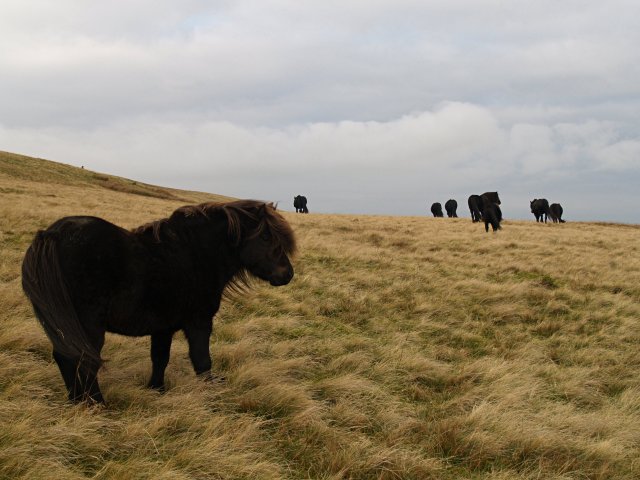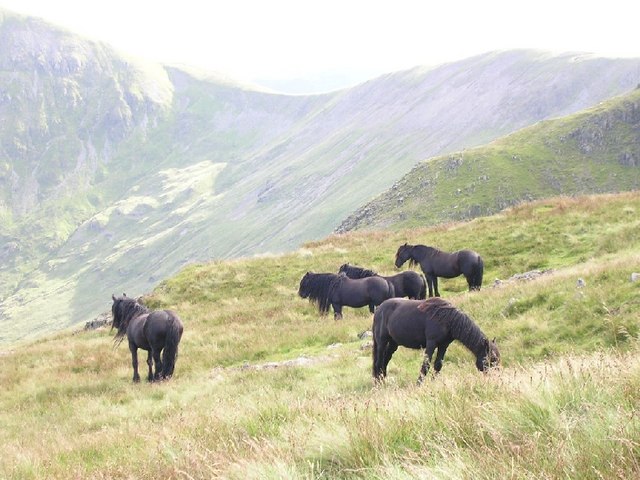
Semi-wild fell ponies, West Fell, 3km from Nether Row, Cumbria: photo by Chris Eilbeck, 4 November 2007
She dwelt among th' untrodden ways
Beside the springs of Dove,
A maid whom there were none to praise
And very few to love.

Semi-wild fell ponies: photo by Roy Wall, 8 May 2005
A Violet by a mossy stone
Half-hidden from the eye!
-- Fair, as a star when only one
Is shining in the sky!
A herd of ponies near Roundhouse near to Mosedale, Cumbria: photo by Helen Wilkinson, 13 November 2007
She lived unknown, and few could know
When Lucy ceased to be;
But she is in her Grave, and, Oh!
The difference to me!

Ford and ponies, Hay Gill: photo by Bob Jenkins, 21 December 2005

Fell ponies roaming free over the commons near Mungrisdale and Caldbeck: photo by Ann Hodgson, 13 August 2003
"She dwelt among th' untrodden ways": William Wordsworth, 1799, from Lyrical Ballads, 1800

Tom,
ReplyDeleteSuch a beautiful poem, to be found here this morning after that full moon all night last night (full at 1:40 this morning) together with these fell ponies -- no one has thought to put these together before, such an act for which all thanks --
3.8
light coming into sky above still black
ridge, two crows calling back and forth
in foreground, sound of wave in channel
is passage into the present,
intentionality of act
form that related to object,
in a way, before that
cloudless blue sky reflected in channel,
sunlit green shoulder of ridge above it
Steve,
ReplyDeleteMany thanks. The elements (poem and ponies) seemed to converse -- across the Fells, across the centuries.
Out wandering the pavements of my own private concrete Cumbria at that small hour, lit up by that huge bright presence in the crisp cold winter night...
I love this poem. One of my favorite poems. I've never seen it like this with "th'untrodden" though. Always "the untrodden." I understand the meter, but I thought it was irregular on purpose. Was this the original version?
ReplyDeleteI loved Wordsworth when I was a young man just beginning to appreciate the craft of bygone poets. His ability to be so concise and accessible had a lot to do with it, and this poem demonstrates that. Thanks for all the great ones you continue to remind me of in these posts Tom. And as for the photos with the poem, Steve said it best "no one has thought to put these together before, such an act for which all thanks"...
ReplyDeleteTom,
ReplyDeleteBeautiful poem..Loneliness is the measure of unusual reach...and i quote from another wordsworth's romantic classic
"Be left more desolate, more dreary cold
Than a forsaken bird’s-nest filled with snow"
I feel cold these days..
As Lally says:
ReplyDeleteThanks for reminding us
Among others
Of lovely, lovely Lucy unknown
To all but lucid Willy.
The landscape of the Fells has probably not changed much since Wordsworth wrote the five "Lucy" poems in the Lyrical Ballads.
ReplyDeleteOne could as well imagine it populated with sheep as with ponies, then as now.
It probably looked much as it does here.
That's not the gravestone of Lucy, by the way. If she ever existed, no one knows who she was; some have speculated she was conflated out of imaginal projections of the poet's sister Dorothy.
The simple ballad stanza deployed to such wonderful effect in this poem was probably learnt by WW from Percy's Reliques of Ancient English Poetry.
He was 28 in 1798, when he began drafting these pristine lyrics.
There were additional draft stanzas in this one.
Tom, this version of the text is as it appeared in the original edition of the Lyrical Ballads.
The comments from Michael, Manik, Tom and Vassilis, following on Steve's, show that like all the greatest poems, this one continues to live for us, and to move us -- whoever and wherever (New Jersey, India, Connecticut, Greece, Bolinas, if I've got the loci of our genii right) we are.
What more could one ask.
Tom,
ReplyDelete"like all the greatest poems, this one continues to live for us, and to move us -- whoever and wherever (New Jersey, India, Connecticut, Greece, Bolinas, if I've got the loci of our genii right) we are."
thanks for this too, here here!
This is so very wonderful. I cannot wait to share it with my family and other people I correspond with and care about. Curtis
ReplyDeleteLovely Curtis, great to hear that.
ReplyDeleteOur little poetry group at the library met up with Mr. Wordsworth just last week.
ReplyDeleteAnd what a lovely time we had. We usually discuss 3 poems over an hour and a half's time but when we passed an hour on the first - Tintern Abbey - we threw all caution to the winds and enjoyed the hell out of it.
Thanks for this lovely posting ...
Don,
ReplyDeleteThrowing caution to the winds -- see Bruegel's proverbs -- "To toss feathers in the wind" -- would probably be the right thing to do...
This small poem manages to be as light as a feather, while possessing a kind of inner tensile strength that makes it as tough as hardened steel.
And yet... to breathe too hard would be to blow it away.